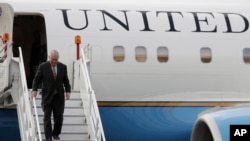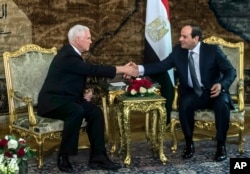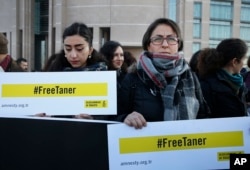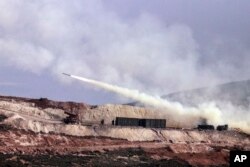Building on Vice President Mike Pence's recent visit to Cairo, Secretary of State Rex Tillerson plans to strengthen a shared commitment between the United States and Egypt to fight terrorism.
Tillerson is in Cairo to begin a five-country Middle East trip. He is also visiting Jordan, Turkey, Lebanon, and Kuwait from February 11-16.
The chief U.S. diplomat is meeting with Egyptian President Abdel Fattah al-Sissi and Foreign Minister Sameh Shoukry to discuss other regional security issues such as Libya and Syria, as well as Israeli-Palestinian issues.
Egypt has launched a major military offensive against militants on the Sinai peninsula, said to be a major counterterrorism operation.
Turkey
In Ankara, Tillerson will press Turkey to release Americans detained by Ankara, and urge the NATO ally to show restraint in military operations in northern Syria, according to senior U.S. officials.
"At times like this, engagement is all the more important," said a State Department official on Friday, while acknowledging, "It's going to be a difficult conversation."
The top U.S. diplomat's visit to Ankara comes amid escalated tensions between the two NATO allies over a series of disagreements, including human rights cases and the Syria crisis.
"Look, it's difficult. The rhetoric is hot, the Turks are angry and this is a difficult time to do business, but it's our belief that there are still some very fundamental underlying shared interests," the senior official said Friday.
The State Department says U.S. citizen Serkan Golge, a NASA scientist who was arrested in July 2016, was convicted "without credible evidence" on February 8 by Turkish authorities for being a member of a terror organization. On February 1, Amnesty International's Turkey chairman, Taner Kilic, was re-arrested and placed back in pretrial detention. Kilic is facing terrorism charges.
The State Department said it is deeply troubled by those cases and urged the Turkish government to "end the protracted state of emergency, to release those detained arbitrarily under emergency authorities, and to safeguard the rule of law consistent with Turkey's own domestic and international obligations and commitments."
In the year after a failed coup in July 2016, Turkey arrested more than 40,000 people and fired 125,000, including many from the police, army and judiciary.
Turkish President Recep Tayyip Erdogan accused Fethullah Gulen, an exiled cleric based in the Unitewd States, of orchestrating the attempted coup. Gulen has denied any role in the plot. Ankara has also asked Washington to extradite Gulen.
The lack of trust between Washington and Ankara grew after Turkey started an air and ground offensive in Afrin, Syria, against a Kurdish group known as the People's Protection Units, or YPG. Turkey considers the YPG to be a terrorist organization, alleging it is an extension of a Kurdish group fighting for autonomy in Turkey for decades.
The United States denies those connections and sees the YPG as a key ally in the battle against Islamic State militants.
"We are urging them [Turkish authorities] to show restraint in their operations in Afrin, and to show restraint further along the line across the border in northern Syria," said a senior State Department official.
"We can work with them to address their legitimate security concerns while, at the same time, minimizing civilian casualties and above all else, keeping everything focused on the defeat ISIS fight, which is not over," he added, using the acronym of the Islamic State militants.
Jordan and Lebanon
In Amman, Tillerson will meet with the Jordanian leadership on the conclusion of a new memorandum of understanding on bilateral assistance, and discuss key regional issues, such as the ongoing crisis in Syria and Jordan's support for Middle East peace.
In Beirut, he will meet with Lebanese President Michel Aoun, Prime Minister Saad Hariri, and Speaker of Parliament Nabih Berri to emphasize U.S. support for the Lebanese people and the Lebanese armed forces.
Ministerial meeting in Kuwait
The chief U.S. diplomat will also lead a delegation to the ministerial meeting in Kuwait of the 74-member Global Coalition to Defeat ISIS. He will also participate in the Iraq Reconstruction Conference, which is the first since Islamic State was defeated in Raqqa, Syria and Iraq declared some of its own territory liberated.
The three-day Iraq Reconstruction Conference will showcase private sector investment opportunities and international support for Iraq.







